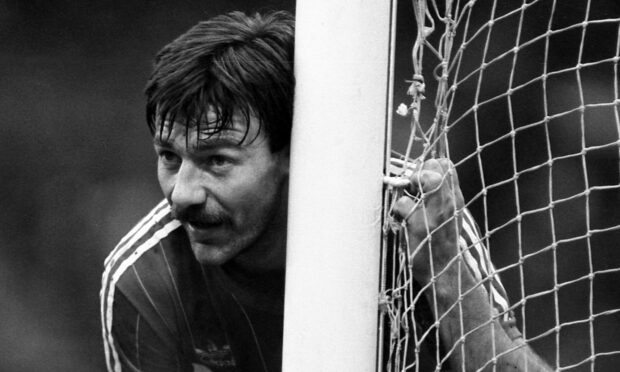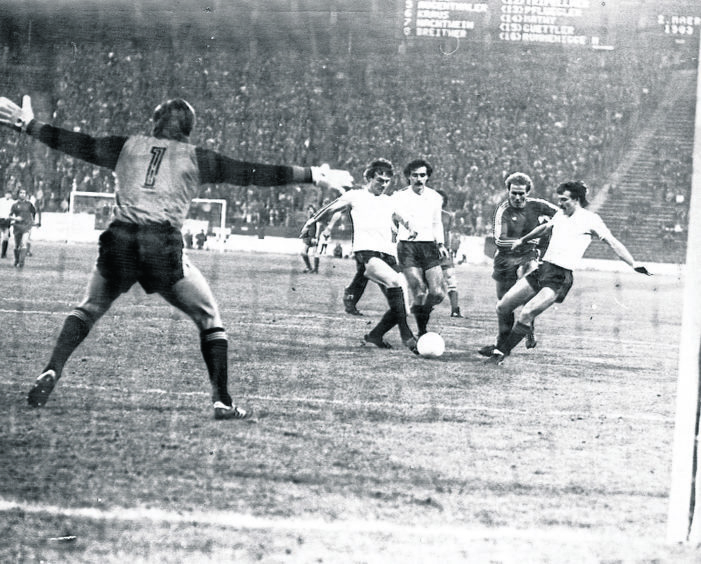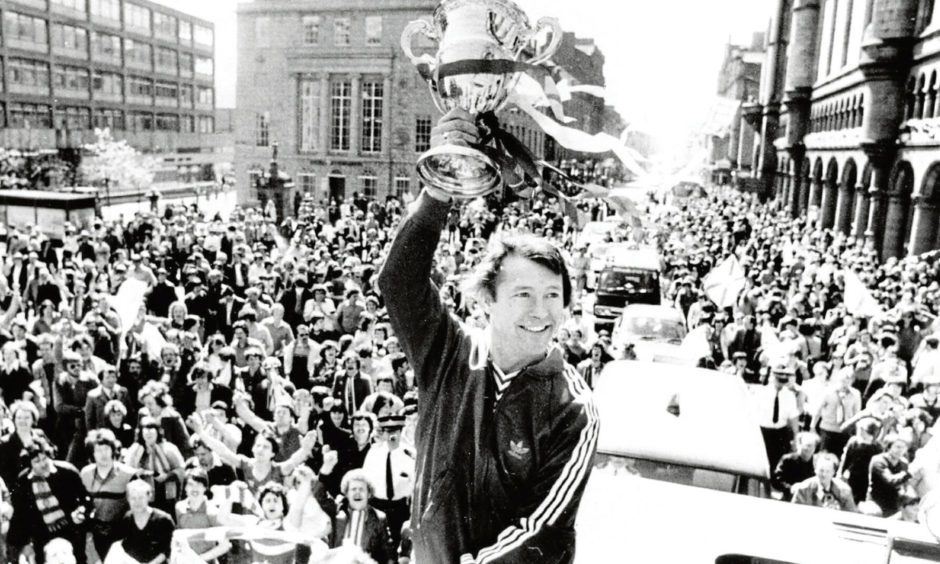Gothenburg Great Stuart Kennedy revealed there were no nerves or fear within the Aberdeen camp ahead of the biggest game in the club’s history.
Aberdeen had progressed from the early preliminary round to face the mighty Real Madrid in the 1983 European Cup Winners’ Cup final – 40 years ago this Thursday.
Instead of apprehension, Kennedy insists there was a steely calm within the Dons’ dressing room at the Ullevi Stadium in Gothenburg.
At the time Real Madrid were six-time winners of the European Cup – they have now claimed that honour an astonishing 14 times.
Their reputation did not faze Alex Ferguson’s Reds, though, who would register a historic 2-1 win after extra-time to lift the prestigious trophy.
Aberdeen remain the last club to beat Real Madrid in a European final.
Kennedy, 69, said: “There was no one sitting biting their fingernails in that dressing room about playing Real Madrid, we were a confident bunch.
“Before the game, you go into your own thoughts and concentrate, but there were no nerves.
“We all looked around our dressing room before that final and saw a lot of great players.
“We all knew we were a threat to Real Madrid.
“Earlier in the tournament we had drawn with Bayern Munich in Germany, totally outplaying them in the quarter-finals.
“Then we beat them 3-2 at Pittodrie.
“Real Madrid were maybe thinking: ‘We are not playing a team like Barcelona, AC Milan or Inter Milan. It’s Aberdeen – who are these guys?
“They quickly found out who we were, because we were superb.
“We delivered a master-class of European football in that final.”
Ferguson’s respect for Kennedy
Kennedy was an unused substitute against Real Madrid as he was sidelined with a knee injury which would ultimately end his career.
The defender suffered the injury in the 1-0 Scottish Cup semi-final win over Celtic at Hampden on April 16.
Kennedy then aggravated the problem just five days later in the 1-0 Cup Winners’ Cup semi-final second leg loss to Waterschei in Belgium – a tie the Dons won handsomely on aggregate.
The Reds had emphatically beaten Waterschei 5-1 at Pittodrie in the first leg to all, but seal a final spot.
Although he was injured and unable to play, Ferguson named Kennedy on the bench in Gothenburg.
It was a mark of the immense respect the now-Sir Alex had for the Scotland international.
‘They thought we were a pub team’
Kennedy reckons the fearlessness and unwavering confidence within the Dons squad in Gothenburg was forged in two key away ties in that Euro campaign.
Aberdeen drew 0-0 with Euro giants Bayern Munich away in the quarter-finals.
They also registered the same score against Dinamo Tirana in Albania at a time when the nation was suffering the upheaval of military coups.
He said: “The away quarter-final tie at Bayern Munich was a colossal step for us.
“Obviously the game at Pittodrie was the fairytale one, 2-1 down with 15 minutes left and we go on to win 3-2.
“That is the one game fans remember in their hearts.
“However, the match in Munich was so important.
“As we lined up in the tunnel beside Bayern in Germany, I could see in their body language that they thought we would be a pushover.
“The problem for Bayern Munich was that we recognised they thought that.
“It is always good to be underestimated.
“I said to the lads: ‘They think we’re a pub team boys. When we get on the park, they’ll find out we’re no pub team.’
“We played Bayern off the park in that game.”
Silencing Balon d’Or winner Rummenigge
Bayern Munich were three-time European Cup champions when they played the Dons, having won the tournament in 1974, 75 and 76.
Facing Aberdeen in their ranks was legendary attacker Karl-Heinz Rummenigge, who had won the Balon d’Or in 1980 and 1981.
Just a year prior to facing the Dons, Rummenigge had played for Germany in the World Cup final, losing 3-1 to Italy.
Bayern Munich also included 1974 World Cup winner Paul Breitner, who had scored in the Germans’ 1982 World Cup showpiece loss.
Kennedy said: “As a back four that game against Bayern was probably the easiest for myself, big Alex (McLeish), Willie (Miller) and Dougie (Rougvie) at that level.
“Our midfielders hunted them down and did the majority of the work.
“I remember Rummenigge coming deeper and deeper.
“I said to Alex: ‘Rummenigge is going dropping deep, towards the half way line.’
“Alex turned to me and said: ‘Good. I hope he stays there.’
“Our midfielders really put in a shift in Munich.
“Bayern thought we were going to hump the ball up the park. but quickly found out we kept it on the deck and played European football.”
Military coup and oppressive heat
Having defeated Swiss club Sion 11-1 on aggregate in the preliminary round, the Dons were drawn against Dinamo Tirana.
A 1-0 win at Pittodrie set up a nervy trip behind the Iron Curtain to communist Albania.
The tie was played with the backdrop of a military uprising.
On the same day as the return leg on September 29, Albania was rocked by the attempted coup, which ended with insurgents being killed in a beach raid.
During the match, militia armed with machine guns stood guard at the 20,000-capacity Qemal Stafa Stadium.
The kick-off against Dinamo Tirana was moved forward to 2.45pm due to the oppressive 100-degree heat.
Kennedy said: “When we went to Albania, it was still a communist stronghold.
“They had military coup.
“As well as the military situation in the background, the fire alarms were going off at two in the morning in the hotel to upset our sleep.
“The footballs they gave us were rotten and almost hexagons. We were not getting spherical objects.
“The training ground was like a ploughed park and the bus to take us there was late.
“They were trying to upset us, but it didn’t work.
“We knew all about facilities like that as we had trained at the car park at Pittodrie. Down at the beach, windswept Balgownie, at Seaton Park in between the dog dirt – we had trained in all those places.
“We had never been brought up in state-of-the-art training grounds.
“So we were capable of dealing with anything, it wasn’t going to throw us.
“The away game in Tirana and the Bayern Munich away were the big ones for me.
“As a player you just want to play football. but there are always distractions and you have to deal with that.
“We had a lot of tough characters who could handle it.”
The genesis of the Gothenburg Greats
For Kennedy, though, the first major step towards European Cup Winners’ Cup glory and Scottish football immortality began three years earlier.
Kennedy pinpoints two high-pressure games at title rivals Celtic in 1979-80 as pivotal to the rise of the Reds to become Euro champions.
Aberdeen beat Celtic twice at Parkhead within two weeks to take control of the Premier Division title race.
They triumphed 2-1 on April 5 before again overcoming Celtic 3-1 on April 23 to move top of the table on goal difference.
Aberdeen would go on to win the league title that season, finishing one point ahead of Celtic.
It was the Dons‘ first league crown since 1955 and Kennedy believes it was the catalyst to go on and conquer Europe.
He said: “The foundation of our success was when we won the league in 1979-80.
“We beat Celtic twice in just two weeks at Parkhead.
“That was what was required and we did that.
“We had to beat our main rivals Celtic twice away from home, that was the bottom line.
“And we passed that test quite easily.
“The whole fabric of Aberdeen’s future started with those two wins at Celtic and lifting the title.”







Conversation